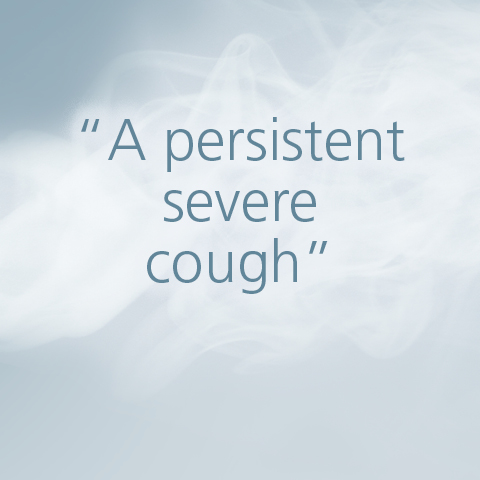Acute bronchitis generally resolves within a few days or weeks but chronic bronchitis develops gradually. It is caused by a slow inflammatory process in the bronchial tubes. Many of those affected do not realise that regular expectoration (coughing up sputum) in the mornings can be a sign of disease. Many smokers see this is a perfectly normal side effect of smoking.


A persistent severe cough and mucous in the bronchial tubes can be an indication of chronic bronchitis. Symptoms of a cold such as rhinitis (blocked or runny nose), exhaustion and headache are also typical. If the bronchial tubes narrow in later stages, the disease can transition to become chronic obstructive bronchitis. Those affected increasingly experience shortness of breath.
The symptoms develop over a period of months or years. Morning coughing is initially only transient, especially in autumn and winter. A regular and persistent cough, even in summer, is a clear warning sign that the disease is advancing. This applies especially to smokers: they should stop smoking immediately.
Not only smokers tend to play down their cough – many of those affected attribute increasing shortness of breath or wheezing breath sounds to age or unfitness. A lung function test at the lung specialist quickly clarifies if these bronchitis symptoms are the result of a chronic disease affecting the airways.
If lung function is still normal in a patient with chronic bronchitis, there is a chance that the disease can resolve. What is important is to remove the cause of the damage as far as possible to prevent the bronchial tubes from narrowing.
Patients only have mild symptoms (cough with sputum). The lung function test shows slight narrowing of the airways and patients only experience shortness of breath with intense physical exertion.
Patients experience coughing and sputum production every day. They become short of breath after even only mild to moderate exertion. Their airways show moderate narrowing.
Patients become short of breath after only the slightest exertion or at rest. Their airways are severely narrowed. There are often low levels of oxygen in the blood. The right side of the heart is strained, patients have arrhythmia and sometimes water retention in the legs. Acute airway infections can be life-threatening. The lung tissue can also become increasingly damaged (pulmonary emphysema).
Contact us
PARI GmbH
Spezialisten für effektive Inhalation
Moosstrasse 3
D-82319 Starnberg
Germany
Tel.: +49 8151 279-220
Fax:+49 8151 279-101
Should you wish to verify the Serial Number of your PARI device, please enter it in the comment section of the contact form and submit it together with your name and email address. No further information is required.
© 2025 PARI GmbH Spezialisten für effektive Inhalation